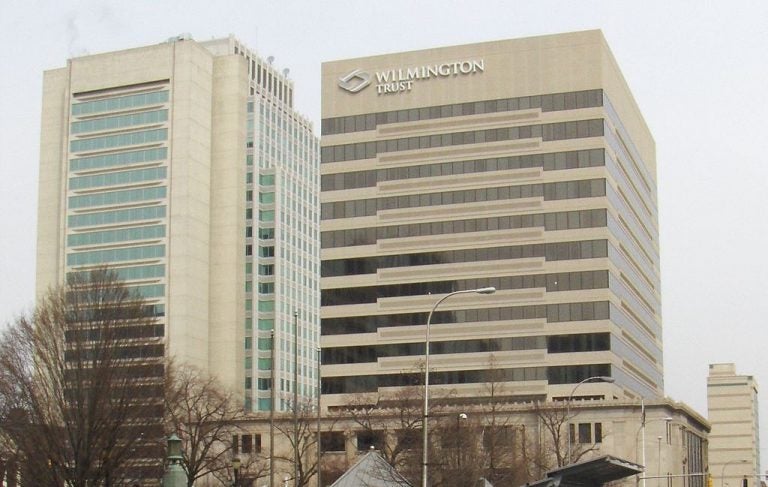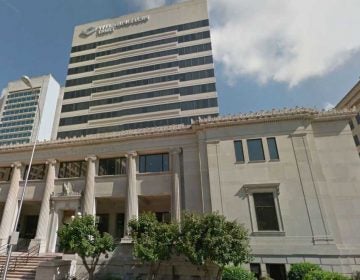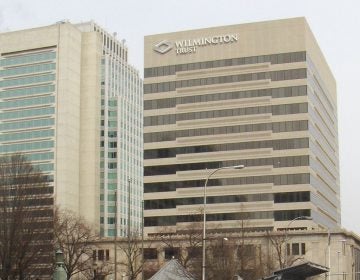Ex-Wilmington Trust president, CFO get 6 years prison for fraud, conspiracy [updated]
The bank's former president Robert Harra Jr. and former CFO David Gibson have both been sentenced to six years in prison for fraud and conspiracy.

Wilmington Trust headquarters on Rodney Square in downtown Wilmington, Delaware. (Wikimedia Commons)
The former president and chief financial officer of the only financial institution criminally charged in connection with the federal bank bailout program were each sentenced Monday to six years in prison for covering up the bank’s troubled condition in the wake of the 2008 financial crisis.
Former Wilmington Trust president Robert Harra Jr. and David Gibson, the bank’s former chief financial officer, also each were ordered to pay a $300,000 fine. Harra, who declined to address the court before he was sentenced, showed no visible reaction afterward, other than blowing out a heavy sigh through puffed cheeks while huddling with his lawyers.
Prosecutors have said Harra and Gibson — along with former chief credit officer William North and controller Kevyn Rakowski — hid millions in bad loans from the Federal Reserve, the Securities and Exchange Commission and the public between October 2009 and November 2010.
They say they schemed to conceal the true volume of hundreds of millions of dollars in losses to raise more money from investors.
Regulators and the public had a right to know the banks true financial condition, said U.S. Attorney General David Weiss.
“It’s about the human cost of the defendants’ actions. The 700 Wilmington Trust employees who lost jobs, shareholders who lost their investments and, in some instances, their life savings,” he said. “Defendants’ families and the community who lost a bank that had been proud and successful institution for decades.”
North and Rakowski will be sentenced Wednesday.
Harra’s attorneys vowed to appeal both his conviction and his sentence, maintaining that he is an “innocent, honorable man.”
“The government tapped into the anger of people who lost money. … I think the jury was looking for a scapegoat,” defense attorney Michael Kelly said Monday.
Prosecutors were seeking a sentence of eight years, while Harra’s attorneys asked for probation, citing a long history of charitable work and community service that has earned him several tributes, including a 2006 “Citizen of the Year” award from the Boy Scouts.
“Justice would be served if your honor would sentence Mr. Harra to probation so he could continue his legendary community service,” Kelly told U.S District Court Judge Richard Andrews.
“His reputation has been destroyed. His reputation is everything to him,” Kelly added. “Honor is everything to him, and this verdict has caused him much anguish.”
Prominent people provided letters to the court attesting to Harra’s character and seeking leniency for him, including former Democratic governor Jack Markell, former Republican governor and congressman Mike Castle, a retired chief justice of Delaware, and former Philadelphia Phillies owner Ruly Carpenter III.
Prosecutors argued that Harra deserved prison time, saying he lied about fundamental metric used by regulators and investors to gauge the health of a financial institution, and that his conduct epitomized “unbridled hubris.”
“When the lies were finally uncovered, it was too late to do anything about them,” prosecutor Robert Kravetz told the judge.
Prosecutors said the defendants misled regulators and investors about Wilmington Trust’s massive amount of past-due commercial real estate loans before the bank was hastily sold while teetering on the edge of collapse. In the fourth quarter of 2009, for example, Wilmington Trust officials reported only $10.8 million in commercial loans as 90 days or more past due, concealing more than $316 million in past-due loans subject to an internal “waiver” practice.
“Not once, however, did defendant Harra disclose the waiver practice,” prosecutors noted in their sentencing memorandum, citing witness testimony. “Instead, defendant Harra told the lead bank examiner in one meeting, ‘Tell your boys in Washington that they’re damn lucky we’re here in Delaware because we’re doing well.”
The century-old bank, founded by members of the du Pont family, imploded despite receiving $330 million from the federal Troubled Asset Relief Program. Before its 2011 fire sale to M&T Bank, Wilmington Trust raised $287 million in a 2010 stock offering, intended in part to help repay the TARP funds, while concealing the truth about its shaky financial condition from investors, prosecutors said.
Wilmington Trust Corp., which was also criminally charged in the case, reached a $60 million settlement with prosecutors last year on the eve of a scheduled trial. The agreement included a civil forfeiture of $44 million and $16 million previously paid by Wilmington Trust to the Securities and Exchange Commission in a related lawsuit.
In a separate civil action, a federal judge last month approved a settlement in which Wilmington Trust agreed to pay $200 million cash to settle a shareholder lawsuit alleging that the bank fraudulently concealed billions of dollars in bad loans. Auditing firm KPMG agreed to pay an additional $10 million as part of the settlement.
WHYY’s Zoë Read contributed to this story.
WHYY is your source for fact-based, in-depth journalism and information. As a nonprofit organization, we rely on financial support from readers like you. Please give today.



